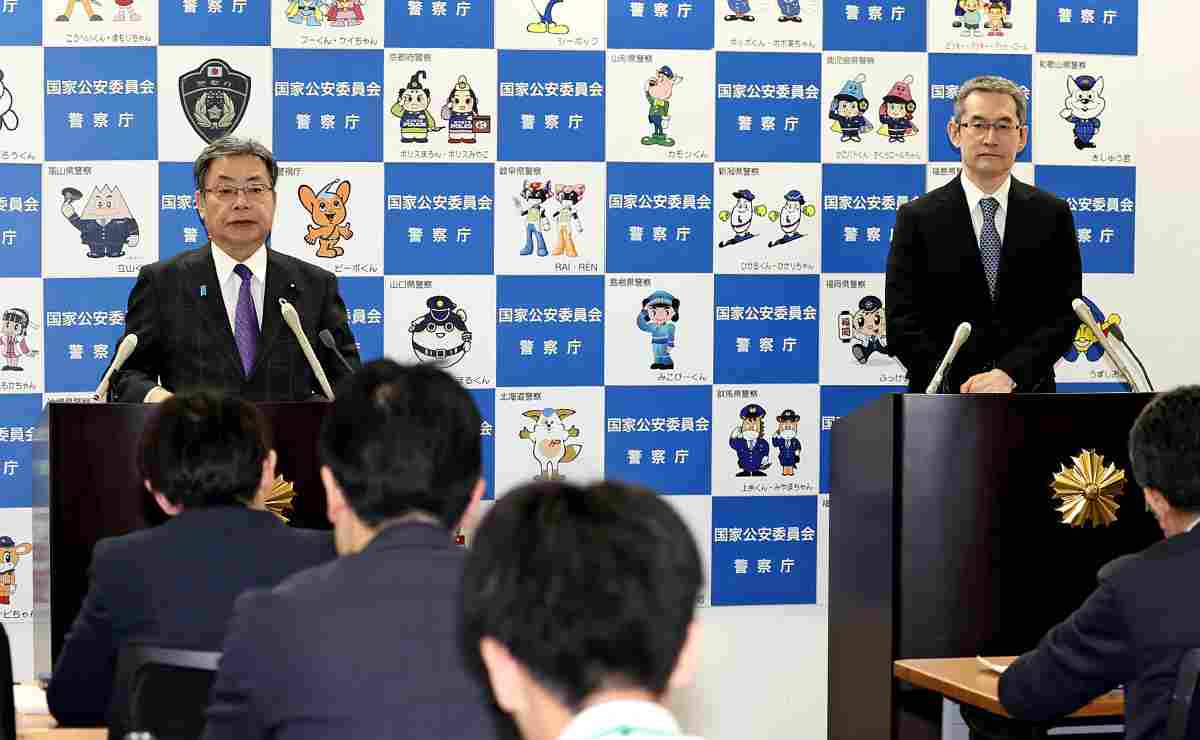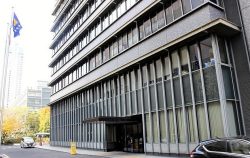
National Public Safety Commission Chairman Koichi Tani, left, and National Police Agency Commissioner General Yasuhiro Tsuyuki speak at a press conference about a report on operations to guard politicians in Tokyo on Thursday.
20:00 JST, June 2, 2023
The National Police Agency’s report on April’s attack on Prime Minister Fumio Kishida in Wakayama Prefecture has shown the NPA’s intention to strengthen measures for protecting VIPs. Coming less than a year after the fatal shooting of former Prime Minister Shinzo Abe, the April attack in which an explosive device was thrown before a campaign speech by Kishida was a serious incident for the police authorities.
However, protection operations may be influenced by the wishes of the politicians who are being guarded, leaving their effectiveness in question.
“I’ll instruct police to take all possible measures to ensure the safety of both the person to be protected and the audience. Police are responsible for protecting them,” Koichi Tani, the chairman of the National Public Safety Commission, said at a press conference on Thursday.
The biggest problem revealed by the report is that the Wakayama prefectural police’s operations went ahead based on assumptions that differed from the actual situation. The prefectural police had been told by the local chapter of the Liberal Democratic Party that the audience would consist of “related parties only,” meaning members of a local fisheries cooperative and their families. But this turned out to be untrue, and police conducted their operations based on an incorrect premise.
In prior discussions with the LDP’s Wakayama prefectural chapter, the prefectural police thought that the fisheries cooperative staff would be responsible for checking who was entering the audience area at the Saikazaki fishing port in Wakayama City, the venue of the event, a presumption that was included in the security plan.
It was assumed that the cooperative staff would look at the faces of visitors to visually confirm whether they were related parties, but no specific procedures were discussed.
The task was effectively left entirely to the LDP chapter and the fisheries cooperative.
The day before the incident, an LDP candidate for the House of Representatives by-election posted on Twitter that Kishida would visit the port, and the LDP headquarters also announced the event on its website, increasing the possibility that unknown persons would come to hear the speech.
The prefectural police became aware of these Twitter posts, but did not review their security plan, and the day of the incident arrived with the incorrect assumption that the audience consisted only of related parties still in place.
“The police accepted the organizer’s explanation without thinking carefully and failed to prevent the suspect from entering the venue. We cannot defend ourselves against the criticism of lacking a sense of crisis as a security organization,” said a senior official of the prefectural police.
Deference to politicians
Traditionally, police have avoided intervening too much in the organization of speeches and other political activities so as not to impinge of the freedom of election campaigns. For example, they do not keep politicians away from the audience or prohibit handshakes if doing so goes against the wishes of the organizers.
This is believed to be due to deference to politicians, who dislike heavy security. When Abe was shot last year, not a single uniformed police officer had been deployed at the speech venue, thus allowing the gunman to approach.
When Kishida was attacked in April, the police requested that the distance between the prime minister and the audience be at least 10 meters, in case someone were to lunge out of the audience area. However, the LDP chapter objected, saying that the distance between Kishida and the audience would be too great and that the audience area would be too small. In the end, the distance was reduced to about 5 meters.
The police also requested that a reception desk be set up to identify visitors and that metal detectors be used to search for hazardous materials, but both requests were refused by the chapter, which claimed that the audience was limited to related parties.
Working with organizers
The report states that the police will work to implement security measures in close cooperation with the organizers in addition to such measures as the deployment of police officers with superior interviewing skills and the expanded use of police dogs.
Specifically, police will show their requests to the organizers on paper or by email to help them clearly understand what is being requested and, on the day of the event, will also check the implementation of the measures taken by the organizers and provide necessary guidance. They will give more careful and persistent explanations to politicians than before, and seek their understanding regarding baggage checks, the holding of the event at an indoor venue and other measures, according to a senior official at the NPA.
“Police were too lenient in that they didn’t change their assumption that no one other than related parties would come even after it became widely known that the speech would take place,” said Mitsuru Fukuda, a professor at the College of Risk Management at Nihon University. “After a series of serious incidents, politicians should also take more drastic measures, such as making speeches indoors, at least for the incumbent prime minister.”
Top Articles in Society
-

Man Infected with Measles Reportedly Dined at Restaurant in Tokyo Station
-

Man Infected with Measles May Have Come in Contact with Many People in Tokyo, Went to Store, Restaurant Around When Symptoms Emerged
-

Woman with Measles Visited Hospital in Tokyo Multiple Times Before Being Diagnosed with Disease
-

Australian Woman Dies After Mishap on Ski Lift in Nagano Prefecture
-

Foreign Snowboarder in Serious Condition After Hanging in Midair from Chairlift in Nagano Prefecture
JN ACCESS RANKING
-

Japan PM Takaichi’s Cabinet Resigns en Masse
-

Japan Institute to Use Domestic Commercial Optical Lattice Clock to Set Japan Standard Time
-

Israeli Ambassador to Japan Speaks about Japan’s Role in the Reconstruction of Gaza
-

Man Infected with Measles Reportedly Dined at Restaurant in Tokyo Station
-

Videos Plagiarized, Reposted with False Subtitles Claiming ‘Ryukyu Belongs to China’; Anti-China False Information Also Posted in Japan
























